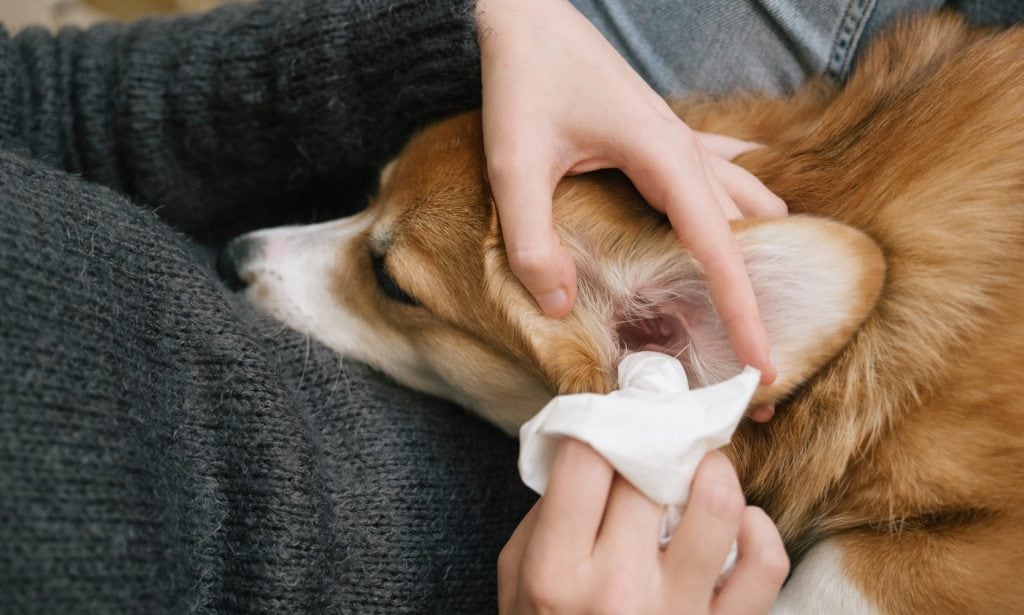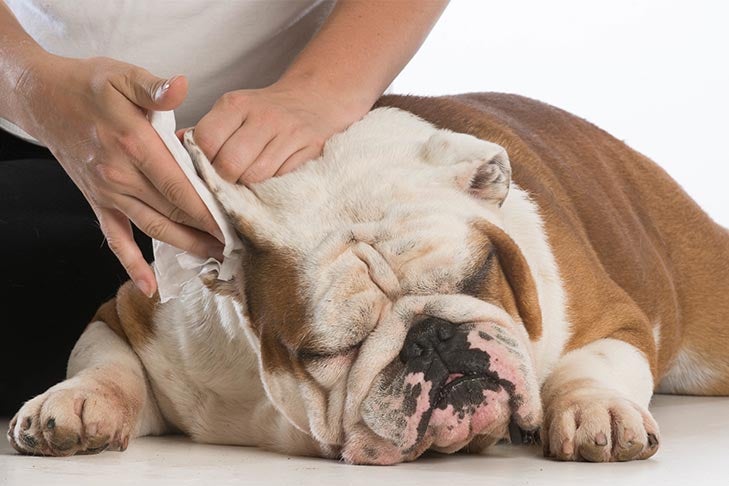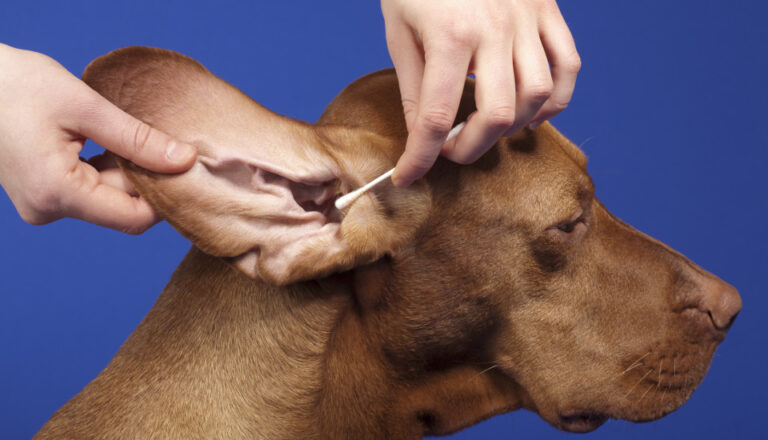To clean a dog’s ears with infection, first, consult a veterinarian for guidance. Then, gently wipe the inside of the ears using a vet-approved ear cleaner and cotton balls.

Credit: www.ourdogslife.co.uk
Understanding Ear Infections In Dogs
Discover how to effectively clean your dog’s ears when dealing with an infection. Learn simple techniques to keep your furry friend comfortable and prevent future ear problems.
Causes Of Ear Infections
Ear infections are a common problem among dogs, but they can be easily avoided and managed with the right knowledge and care. Understanding the causes of ear infections is crucial in preventing and treating them effectively.
There are several factors that can contribute to ear infections in dogs:
- Poor hygiene: Dogs with floppy ears or excessive hair in their ear canals are more prone to developing infections as the warm and moist environment becomes a breeding ground for bacteria and yeast.
- Allergies: Dogs can develop allergies to certain foods, pollen, molds, or even certain cleaning products. These allergies can lead to inflammation and irritation in the ears, making them susceptible to infections.
- Foreign objects: Dogs have a curious nature and may stick their noses into places they shouldn’t. If a foreign object, such as a grass seed or a small piece of debris, gets lodged in the ear canal, it can cause irritation and eventually lead to an infection.
- Ear mites: These tiny parasites can infest a dog’s ears, causing intense itching and irritation. As dogs scratch at their ears to relieve the discomfort, they can inadvertently introduce bacteria, leading to an infection.
Signs And Symptoms
Detecting ear infections in dogs early on is crucial for prompt treatment. Keep an eye out for the following signs and symptoms:
- Excessive scratching of the ears
- Head shaking or tilting
- Redness, swelling, or discharge from the ears
- Unpleasant odor coming from the ears
- Pain or discomfort when the ears are touched
- Changes in behavior, such as irritability or depression
It’s essential to note that the signs and symptoms may vary depending on the severity of the infection, so it’s best to consult a veterinarian for a proper diagnosis.
When To Seek Veterinary Care
While some mild ear infections can be treated at home, certain situations require immediate veterinary care. It’s crucial to seek professional help if you notice:
- Persistent or worsening symptoms despite home remedies
- Bleeding or discharge from the ears
- Swelling or redness spreading beyond the ears
- Loss of balance or coordination
- Difficulty eating, drinking, or breathing
A veterinarian will be able to properly diagnose the condition and provide the appropriate treatment plan for your furry friend. Remember, early intervention is key in preventing complications and ensuring your dog’s well-being.

Credit: be.chewy.com
Preparing For Ear Cleaning
Keep your furry friend’s ears clean and infection-free with these simple steps on how to clean a dog’s ears. From gentle cleaning solutions to proper techniques, ensure your dog’s ear health for a happy and healthy pet.
Preparing for Ear CleaningGather the Necessary Supplies When it comes to cleaning your dog’s ears with an infection, it is important to gather all the necessary supplies beforehand. This will help ensure a smooth and efficient cleaning process. Some essential supplies you will need include:– Cotton balls or pads – Cotton swabs (never insert them into the ear canal) – Ear cleaning solution – Towels or tissues – Treats to reward your dog’s cooperationChoose the Right Ear Cleaner Selecting the right ear cleaner is crucial for effectively treating your dog’s ear infection. It is best to consult your veterinarian to determine the most suitable ear cleaner for your dog’s specific condition. Keep in mind that using improper or harsh cleaning solutions may further irritate the ears. When choosing an ear cleaner, consider the following factors:– pH-balanced formula: Opt for an ear cleaner with a pH-balanced formula to maintain a healthy ear environment for your dog. – Anti-inflammatory properties: Look for an ear cleaner that contains anti-inflammatory ingredients to reduce swelling and discomfort. – Antimicrobial or antifungal properties: If your dog’s ear infection is caused by bacteria or fungi, choose an ear cleaner with antimicrobial or antifungal properties to help eliminate the infection. – Alcohol-free: Avoid ear cleaners that contain alcohol, as they can cause further irritation and dry out the sensitive ear tissues.Create a Calm Environment Creating a calm environment is crucial for a stress-free ear cleaning experience for both you and your furry friend. Dogs can be sensitive about their ears, especially when they are already experiencing discomfort from an infection. Follow these tips to create a calm atmosphere: – Find a quiet and comfortable space where you can easily access your dog’s ears. – Ensure there are no distractions or loud noises that may startle your dog. – Speak in a soothing tone and provide gentle reassurance throughout the process. – If needed, enlist the help of a family member or friend to assist you in holding your dog or distracting them with treats.By preparing and gathering the necessary supplies, selecting the right ear cleaner, and creating a calm environment, you can make the ear cleaning process more comfortable for your furry friend. Let’s move on to the next step of cleaning your dog’s ears with an infection: the actual cleaning process.Step-by-step Guide To Safely Cleaning A Dog’s Ears
Welcome to this step-by-step guide on how to safely clean a dog’s ears. Regular ear cleaning is an important part of your pet’s grooming routine, especially if they have an ear infection. In this guide, we will walk you through the process, ensuring you have all the information you need to effectively clean your dog’s ears and promote their ear health.
Restraining Your Dog
The first step in safely cleaning your dog’s ears is to ensure proper restraint. This is crucial to keep both you and your furry friend safe during the process.
Inspect The Ears
Before applying any ear cleaner, it’s essential to inspect your dog’s ears for any signs of infection or inflammation. Look for redness, swelling, discharge, or a foul odor. If you notice any of these symptoms, it’s best to consult your veterinarian for proper diagnosis and treatment.
Applying The Ear Cleaner
Once you’ve confirmed that your dog’s ears are free from infection, it’s time to apply the ear cleaner. Choose a veterinarian-approved ear cleaning solution specifically designed for dogs. Gently lift your dog’s ear flap and apply a few drops of the solution into the ear canal. Be careful not to insert the dropper too deep to avoid any injury.
Gently Massaging The Ear
After applying the ear cleaner, gently massage the base of the ear for about 30 seconds. This will help distribute the solution and loosen any dirt or debris that may be present. Your dog may find this massage soothing, so take this opportunity to bond with them and provide a positive experience.
Wipe Away Debris
Using a clean cotton ball or gauze pad, carefully wipe away any debris or excess ear cleaner from the ear flap and the visible part of the ear canal. Be gentle and avoid pushing the cotton ball too far into the ear to prevent any damage. You may need to use multiple cotton balls or pads to ensure thorough cleaning.
Reward Your Dog
Finally, it’s time to reward your dog for their cooperation and good behavior throughout the ear-cleaning process. Give them a treat or offer praise to reinforce positive associations with the cleaning routine. This will make future ear cleaning sessions easier and more enjoyable for both of you.

Credit: www.akc.org
Frequently Asked Questions For How To Clean A Dog’s Ears With Infection
How Can I Treat My Dogs Ear Infection At Home?
To treat your dog’s ear infection at home, start by cleaning the infected ear with a vet-recommended solution. Use a cotton ball or cloth to gently wipe the area. Apply prescribed ear drops as directed by your vet. Monitor your dog’s behavior and consult a vet if the infection persists or worsens.
What Can I Clean My Dog’s Infected Ear With?
Clean your dog’s infected ear using a vet-approved ear cleaner. Avoid using water or alcohol.
Can I Put Hydrogen Peroxide In My Dogs Ear?
Yes, you can use hydrogen peroxide in your dog’s ear, but only under the guidance of a veterinarian. It should be diluted with water and applied carefully. If the ear is infected or injured, do not use hydrogen peroxide and seek professional advice.
How Do You Get Rid Of A Bacterial Infection In A Dog’s Ear?
To get rid of a bacterial infection in a dog’s ear, consult a veterinarian for proper diagnosis and treatment. This may involve using prescribed antibiotics and cleaning solutions to eliminate the infection. Always follow the vet’s instructions and complete the full course of treatment for effective results.
Conclusion
Regular ear cleaning plays a crucial role in maintaining your furry friend’s overall health and preventing ear infections. By following these simple steps outlined in this blog post, you can safely and effectively clean your dog’s ears. Remember to consult your veterinarian if you suspect an infection or if your dog shows signs of discomfort.
With proper care and attention, you can keep your dog’s ears clean and healthy for years to come.



